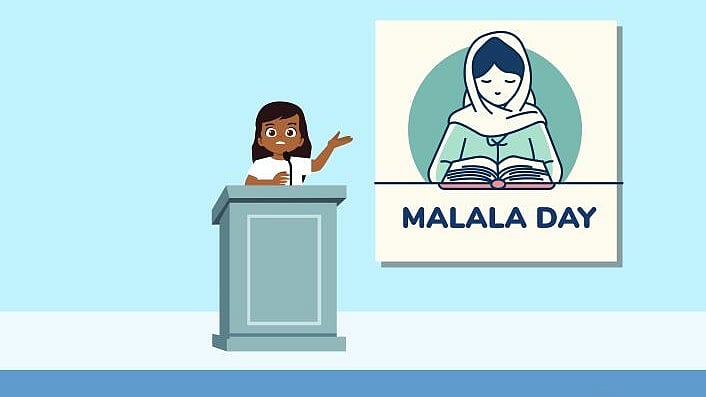
Credit: iStock Photo
It was a sunny day in Gorakhpur, a small village, and young Aisha was jumping with excitement. Her school was celebrating Malala Day, observed on July 12, and she had been chosen to give a special speech about Malala Yousafzai, the brave girl who fought for girls’ education rights.
Even as a little child, Aisha was fascinated by the activist’s story. She admired her courage and determination to stand up for what she believed in. As Aisha prepared her speech, she thought about what she could say to inspire her friends and classmates.
On the day of the celebration,
Aisha stood in front of her school at the assembly and began to speak. “Good morning, everyone! Today, as we celebrate Malala Day, I will be sharing her story with you all,” she opened her speech, with a wide smile.
“Malala is a hero who showed us that even when things look difficult, one can always find a way around them and make a difference. She strongly believed in the importance of education and fought for her right to go to school. Her story is truly inspiring — despite being shot in the head and facing death, she revived and continued to pursue the cause of education. Through her life, she taught everyone around her that we all have the power to stand up for what we believe in!” shared Aisha.
Aisha spoke in detail about how the 2014 Nobel Peace Prize laureaute inspired many. She quizzed the audience about the activist: “How old was she when she was attacked?” Hands went up in the air, and many answered together, “15”.
“What exactly had happened?” was Aisha’s next question. “In 2012, after writing an exam, she and two other girls who were aboard a school bus were shot by a Taliban gunman. During this assassination attempt, she was struck in the head by a bullet,” answered Usher from class 6B.
Nodding to the answers, Aisha continued: “Do you all know an inspiring fun fact? ‘I Am Malala’, a book co-authored by her, came out the very next year. Imagine her willpower and ability to tell her story!”
Next question followed soon after: “Malala was inspired by greats like Abdul Ghaffar Khan and Benazir Bhutto. Who else was she closely inspired by?” Aisha asked.
Akhila from class 7D raised her hand, while curiously asking: “Her father?” Aisha nodded her head excitedly and added: “Ziauddin Yousafzai, her father, was an education activist.” She told the assembly about the Malala Fund, an organisation which works to empower girls through education, and also that Malala completed her degree in philosophy, politics, and economics at Oxford University.
However, Aisha didn’t just want to talk about the young activist. She also wanted to highlight the importance of girls’ education. “Did you know that when girls receive proper opportunities in education, even they can become leaders, doctors, scientists, and so much more? Indira Gandhi was our first female prime minister, Kiran Bedi is our country’s first female police officer, and Arundhati Roy won the Man Booker Prize winner. There is also Indian-origin NASA astronaut Kalpana Chawla. All these women and others have been talked about so much,” she continued.
“Education is like a key that can unlock many doors — to learn new things, to make new friends and meet new people, and to achieve dreams,” said Aisha.
She asked: “Also, have you ever wondered... In most families, it is our mothers and grandmothers who share interesting and fun stories from childhood — they are often our first teachers. If every family has educated female members, no matter which part of the world they belong to, the future of children born into such families will be brighter.”
She went on: “If everyone has access to education despite their gender, it will create parity in families and even at jobs. One will be able to beat several social issues such as dowry and discrimination at workplaces and within families, and take stronger stands.” The speech ended with a huge applause.
The festivities continued, even after the assembly. Aisha’s class teacher had brought sponge cake and sherbet for the class. All her classmates were sitting in a circle in the classroom. Aisha shared about her own dreams and aspirations. “I want to be a scientist one day and make new discoveries that will help people, especially those belonging to lower-middle class families,” she added.
Inspired by Aisha’s words, soon each of them began to talk about their own aspirations. There was Rohan, who wanted to become a doctor and help people in need. There was Priya, who wanted to become an artist and create beautiful paintings, and use a portion of the remuneration to help the needy. And there was Kumari, who wanted to become an engineer and build new and affordable housing infrastructure.
As the day came to a close, Aisha looked around at her friends and felt a sense of pride and happiness. She knew she had made them think and that together, they could achieve great things.